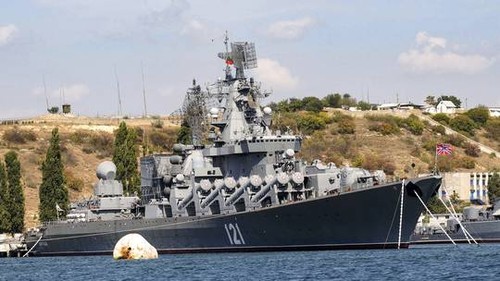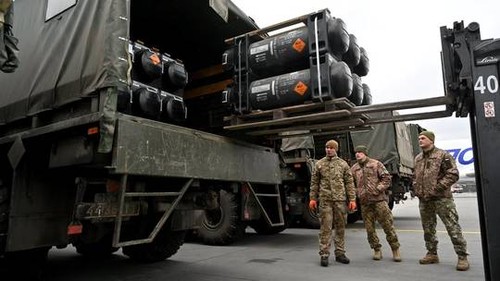 Russia's flagship Moskva of the Black Sea Fleet (Photo: RT) Russia's flagship Moskva of the Black Sea Fleet (Photo: RT) |
More than a month and a half since Russia launched a special military operation in Ukraine on February 24, a much-awaited ceasefire has yet to be achieved despite multiple rounds of negotiations between Moscow and Kyiv hosted by Turkey and Belarus. Western countries are continuously imposing new sanctions on Russia and sending more lethal weapons to the Ukrainian battlefield. The public fear military escalation will grow more dangerous in the days to come.
Military escalation
Russia’s Ministry of Defense announced on Thursday that the flagship Moskva of the Black Sea Fleet sank after an explosion occurred in the ship’s ammunition depot. Earlier, the mayor of the Ukrainian city of Odessa, Maksym Marchenko, said that a Ukrainian Neptune missile had struck the Russian warship. The claim has not been confirmed by any independent source.
Russia's Investigative Committee on Thursday accused two Ukrainian combat helicopters of violating its airspace, attacking residential areas in the western border of Russia and causing some casualties. Although the Ukrainian side denied the accusation, some fear that this could be a dangerous new escalation.
Meanwhile, the West continues to increase combat capacity aid to Ukraine. On Wednesday, US President Joe Biden announced an additional 800 million USD in military assistance to Ukraine, including artillery, armored vehicles and helicopters. Last week, the White House said it had provided more than 1.7 billion USD in security assistance to Ukraine since the conflict broke out. The arms shipments to Ukraine include Stinger anti-aircraft missiles and Javelin anti-tank missiles, as well as a lot of ammunition and armor. CIA director William Burns on Thursday unveiled that the spy agency has been sharing intelligence with Ukraine.
Other members of US-led NATO have also provided more weapons and combat equipment to Ukraine and pledged further support in parallel with additional draconian sanctions on Russia.
 Mobile anti-tank missile FGM-148 Javelin the US sends to Ukraine. (Photo: AFP) Mobile anti-tank missile FGM-148 Javelin the US sends to Ukraine. (Photo: AFP) |
Dialogue and diplomatic solution
However, not all Western countries favor or act in that direction. Other EU and NATO members have worked to promote dialogue with Russia to find a diplomatic solution to the crisis. Earlier this week, Austrian Chancellor Karl Nehammer made a remarkable visit to Moscow, becoming the first European leader to visit Russia since the conflict broke out in Ukraine. At talks with President Vladimir Putin, Chancellor Nehammer stressed the need to increase support for the Russia-Ukraine talks in Istanbul. In the wake of the West's confusion and division in its strategy for Russia, the Austrian Chancellor's visit is seen by many as to bridge Russia and Ukraine and maintain essential contacts between the EU and Russia.
France’s far-right presidential candidate Marine Le Pen said on Wednesday that once the current conflict in Ukraine ends, she would propose closer links between NATO and Russia and the resumption of the strategic friendship between the two sides.
UN Secretary-General Antonio Guterres on Wednesday called on Russia, Ukraine and relevant parties to maintain and promote dialogue to end the conflict. From Beijing, Chinese Foreign Ministry Spokesperson Zhao Lijian said on Monday that dialogue is the only right way to resolve the Russia-Ukraine crisis and the West should promote peace by taking practical steps, instead of imposing sanctions.